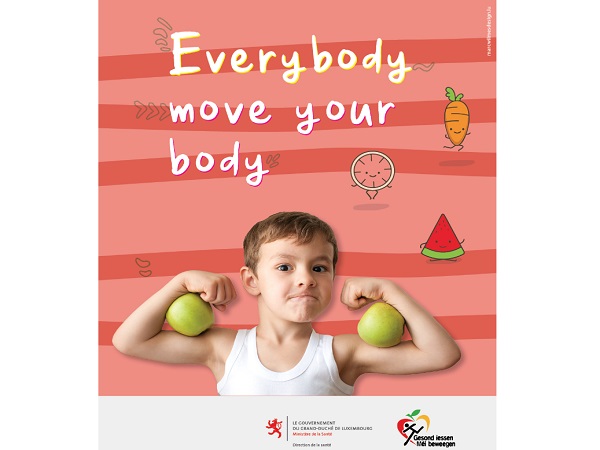 Credit: MSAN
Credit: MSAN
On the occasion of World Obesity Day, held annually on 4 March, Luxembourg and other governments around the world and their partners are trying to promote a balanced diet and regular physical activity.
According to the European Health Interview Survey (EHIS) conducted in Luxembourg in 2019, the proportion of obese adults increased from 15.6% to 16.5% between 2014 and 2019. The proporion of obese men (18.4%) was higher than that of obese women (14.6%). In addition, 40% of men and 24% of women in Luxembourg were categorised as overweight in 2019.
On the topic of World Obesity Day, Luxembourg's Minister of Health Paulette Lenert explained: “In terms of food, it is about improving the dietary practices of populations and ensuring healthy food products. In terms of physical activity, the objective is to reduce sedentary lifestyle and strengthen physical activity practices favorable to health".
In the context of the COVID-19 pandemic, containment measures have changed our daily habits, both in terms of food and physical activity, and increased the risk of weight gain and obesity. The Health Minister added: “The promotion of a balanced diet and regular physical activity is all the more important in times of pandemic because there is a proven link between obesity and COVID-19. A person who is obese has both a higher risk of contracting the coronavirus and a risk of developing a severe form of the infection".
Being overweight or obese increases the risk of developing heart disease, type 2 diabetes and certain cancers. They are mainly caused by an unbalanced diet and lack of physical activity.
The Trends Report 2006-2018 on Health Behaviour in School-Aged Children (HBSC), published in 2020, revealed that the proportion of adolescents aged 11 to 18 who were overweight (overweight and obese) increased from 14% in 2006 to 19% in 2018.
For the 2019-2020 school year (September-March), school medicine statistics on obesity revealed that 4.3% of primary school children were obese and 7.48% were overweight. In secondary schools, 9.91% of students were obese and 9.35% were overweight.
To face this problem, Luxembourg's Ministry of Health, the Ministry of Sport, the Ministry of Education, Children and Youth and the Ministry of Family, Integration and the Greater Region (all co-founding members of the 2006 "Gesond iessen - méi bewegen", or GIMB, interministerial strategy) renewed their collaboration in 2018 by formalising the GIMB (eat healthy, move more) programme in a national 2018-2025 framework plan. The objective of this interministerial collaboration is to jointly promote a balanced diet and regular physical activity in order to fight against the problem of obesity and sedentary lifestyle for the entire population. For the Minister of Health, "this interministerial collaboration makes it possible to act jointly in different fields and to reach different target populations".
Over time, a real GIMB network has developed around the four co-founding members and has attracted other ministries as well as partners in the field wishing to mobilise around the subject. This collaboration is visible, for example, through the GIMB label, which is a sign of recognition of quality in the field of health promotion. Any administration, association or company can apply for the GIMB label for its project if it aims to promote a balanced diet and regular physical activity. This label allows them to ask the four ministries concerned for teaching material, advice or financial support.
In the second national GIMB framework plan, special attention is given to communication, information and public awareness. The website www.gimb.public.lu was launched in 2020, allowing the general public, professionals in the sector as well as decision-makers to more easily access national recommendations and advice on a balanced diet and regular physical activity grouped together in one place.








